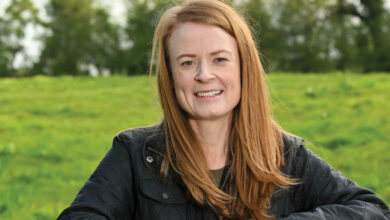Friends of the Earth: the case against fracking
 Friends of the Earth Director James Orr outlines his organisation’s opposition to hydraulic fracturing and predicts that the industry’s own arguments will prove counter-productive.
Friends of the Earth Director James Orr outlines his organisation’s opposition to hydraulic fracturing and predicts that the industry’s own arguments will prove counter-productive.
Fracking for shale gas in Northern Ireland is both unnecessary and unwanted. The evidence against the industry is so strong that I feel confident in predicting that fracking for shale gas will never become a viable industry in Northern Ireland.
I say this not because of the overwhelming environmental arguments but in spite of them. I shall get them out of the way quickly. I am by now used to those in authority making a career out of ignoring the environmental arguments.
Northern Ireland is not an arid, featureless desert. It is as far from a waterless desert as you could imagine.
It’s a wet and busy place where you are seldom far away from a family farm, a ribbon of development or a Bronze Age rath. Fermanagh, like the 11 other council areas subject to existing or proposed licences, would need to be industrialised and contaminated with so many thousands of frack pads to make the industry viable that there simply isn’t the room without squeezing out people, jobs and habitats, and fracturing communities.
The most compelling environmental argument is that we must move from generating almost all of our electricity from fossil fuels, to generating most of them from renewables by 2030. Fossil fuels simply have to be phased out if we are to deal with the climate crisis. Seeking out new sources of fossil fuels is at best a distraction from developing other energy sources and sets us in the wrong direction.
No promised land
In the end, all we need to do is listen to the fatuous statements of the fracking industry. The chronic lack of an evidence base behind their claims of bringing us to a promised land will, in the end, be their downfall.
Tamboran announced recently those against fracking are “anti-jobs”. This is a common enough tactic frequently used to demonise the opposition but quite ludicrous when it is the fracking companies who will take away jobs in farming and tourism, and affect house prices. Claims that there will be 600 jobs in Fermanagh are not reliable. Most employment is in the drilling phase that lasts about a year and many are for specialised transient workers.
Another claim by Tamboran is that fracking will not affect biodiversity and, through mitigation, “it will probably help biodiversity”. This is a preposterous assertion as water contamination is highly likely in an area full of wetlands and water catchments.
Tamboran claim there has never been a proven record of contamination associated with the fracking industry. Again, not true. There is growing evidence emerging from the United States and Australia of the health and pollution effects and the uninsurability of the industry. For example, one study of aquifers overlying the Marcellus and Utica shales in the northern USA found “systematic evidence of methane contamination of groundwater associated with shale gas extraction”.
An early tactic was that Tamboran promised us chemical-free fracking. That means we would be the first in the world to frack without chemicals with just fizzy water coming out of the ground – a term I have heard them use to explain the characteristics of toxic waste water to politicians at Stormont.
We know it is technically impossible to frack without a huge volume of chemicals. Around 75,000 litres of chemicals are needed per frack and an assessment of 353 chemicals known to be used in fracking in the US revealed:
• 25 per cent are carcinogenic;
• 40-50 per cent could affect the nervous and immune system; and
• more than 75 per cent could affect the skin, eyes and respiratory system.
This is not to mention the naturally occurring radioactive material and dangerous substances such as benzene and strontium liberated from deep underground.
Regulation
Another claim from Tamboran is that we have one of the best regulators in the world: “They are impartial, expert and will allow no less than the best.”
Excuse me? Try telling that to the people of who live beside dozens of unregulated quarries or explain the chronic pollution of Lough Neagh from which most of Belfast gets its drinking water.
Factor in a planning authority which admits that of all current applications for mineral extraction, 60 per cent are retrospective.
We have allowed to develop here such a poor record of environmental governance that managing relatively obvious risks above the ground (such as unauthorised quarries and illegal dumping) has been neglected to the point where we have strong evidence of institutional failure.
It is reasonable to assume that if we cannot regulate conventional risks then it is difficult to comprehend how we could manage such a controversial and potentially dangerous activity such as fracking. Even in an ideal regulatory regime, we may be able to make fracking safer but we could never make it safe.
The latest gimmick announced by Tamboran at the recent energy conference organised by agendaNi was the prospect of cheap gas for people in Fermanagh.
This is the stuff of fantasy. Ofgem recently reported that lower gas prices through a shale boom was “a low probability outcome”. The International Energy Agency states that operating costs in Europe will be 30-50 per cent higher than in the States.
Global market dynamics means that demand soaks up existing supplies, never mind the obvious market imperative that we are tied into a European gas market and prices will not be impacted by relatively short-term and small supplies from here.
Community actions
There are so many other reasons (economic, legal and political) why fracking is a gamble Northern Ireland does not need to take. We have better things to be doing than chasing after the nonsensical claims of the fracking industry. We have huge reserves of untapped renewable energy if only we could plan for its deployment and we need to start the debate about dealing with the fact that we currently waste around a third of our energy.
So, will Northern Ireland allow itself to be fracked? To be sure, Tamboran and others have some of the most powerful ministers on their side and a business lobby that sets an agenda of equating financial self-interest with economic public interest.
We see, however, from the stopping of the A5 road, the unravelling of the gasification proposals for Derry/Londonderry and the rejection of the chicken litter incinerator at Glenavy, that community action will successfully oppose unsustainable development, especially when people are pushed too far by fantastical claims and an absence of evidence.
Both Friends of the Earth and the fracking companies cannot be right. My contention is that the difference is that we have the evidence on our side.
We agree that we needs lots of development. All we ask is that the development is sane and sustainable and we embrace prosperity for all in the safer, greener and secure low carbon economy.





